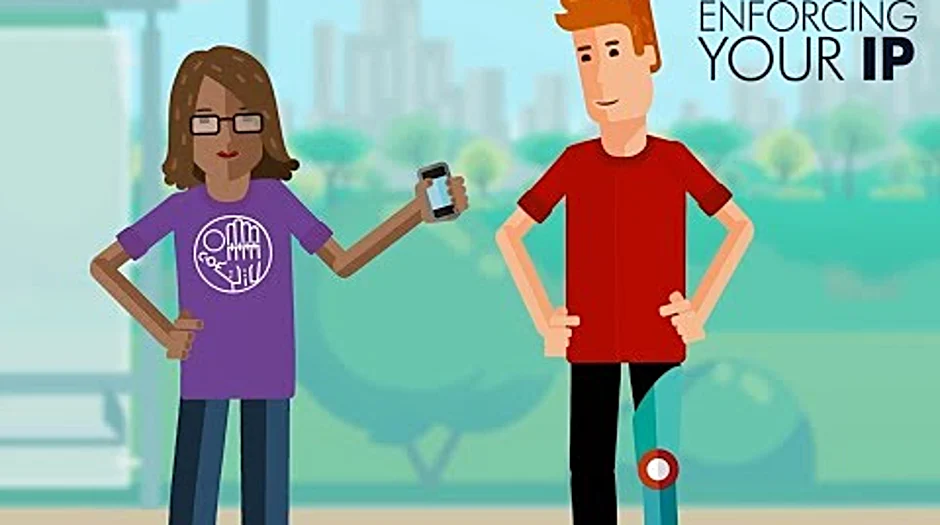Intellectual property enforcement directive [Real Research]
Table of Contents
Last updated : Sept 28, 2022
Written by : Victor Stark |
Current |
Write a comment |
Did you find this article relevant to what you were looking for?
Write a comment
Comment by Jan Crespi
this is one in a series of videos about intellectual property and you once you are the owner of registered IP rights such as a patent trademark industrial design or copyright you become responsible for enforcing them enforcement can be an expensive battle so if you suspect you have an infringement case you should strongly consider consulting a lawyer to get an estimate of the costs involved you should also consult the Canada Border Services Agency website to get more information on counterfeit and pirated products entering or leaving Canada there are various methods for managing infringement that can be used including negotiated licensing mediation arbitration or litigation let's have a closer look negotiated licensing happens when two parties come together to develop a license agreement between themselves don't forget that most forms of IP can be licensed to others so infringers can also represent opportunities for new partnerships and generate new profits if the two parties can't reach an agreement another method is mediation that's when an independent party also known as a mediator guides negotiation between two parties the mediator who is chosen by the parties remains neutral and facilitates the discussion arbitration is an alternate option of enforcement and is often attempted after failed negotiations or mediation arbitration is similar to mediation as a third party is involved but different in that the third party has the ability to impose a decision or settlement of the issue finally one more potential enforcement option is known as litigation typically litigation is the last resort in a failed negotiation between two parties it's often very expensive administrative leak complex and can take a substantial amount of time in litigation both parties present their cases to the court who then hands down a ruling as to how the matter is to be resolved remember when it comes to enforcing your rights and protecting your IP always remember to be proactive and keep an eye out for new products and services being launched in the market
Thanks for your comment Jan Crespi, have a nice day.
- Victor Stark, Staff Member
Comment by odsesam0
hi friends today is the day with a gun bang bang bang yes this is enforcement so enforcement you have traditionally criminal enforcement right you have the civil enforcement and you have administrative enforcement so i would not go about criminal enforcement that is up to the member states there's no harmonization there is no one rule within the single market every country has its own tradition with regard to criminal enforcement so that is out of discussion here civil uh enforcement is the one i will take into account and a bit of administrative enforcement but let me put one thing clear administrative enforcement the eu ipo is out of the game not well it's different in some countries so therefore i mention it the eu ipo is the managing agency for the trademark system in europe but it has no enforcement in capacities or competency beyond the fact that they can manage their registry meaning that they are able being seized to delete or to reject so to say one trademark or the other but they cannot enforce the trademark law in beyond that so therefore we have ipret ipred is the ip rights enforcement directive so very quickly the directive is a legal instrument and regulation is an eagle legal instrument both of them are used by the commission in order to make so to say the european law palpable and and life going life so the regulation is something like the trademark regulation or trademark implementing regulation which is directly applicable in each member state once the council european council or the and the parliament has decided upon it had adopted it now the directive is a bit different once the the member states are clear they make a regulation if they are less clear though well we have some minimum standards but i don't know i i will doing this and i will doing that then the member states they well the council which are the member states they would choose a directive a directive which gives minimum standards and beyond the minimum standards each country is doing what they want to do but the minimum standards have to be adopted but it is not directly applicable because it has to be transposed into the law of the member states first and there are some years so in order to do so three four years and then afterwards the national law is applicable although inspired by the directive you get this okay this is a directive i preft is a director so it has been transposed into the law of the member states that was adopted in 2004 and then in 2000 what was it seven or eight or nine then it has been transposed into all the national law of the member states and there are six main issues so to say and here is the the so the summary of it in that table where you can see what are were the objective the six objectives of the i prep and i will go into each of them just one thing before the ipret is applicable not only to trademarks but to a variety to all of ip rights so is that the right way to to tackle it i don't know well it is the case what it is ibrat was adopted in 2004. i say and as with many things in eu after 10 years you want to want to see how is it functioning was it okay to be adopted or what what kind of modifications we need to be do in order to be efficient right so that was uh in 2014 and 1516 there were some studies ongoing and the last comprehensive document of the review of ipred was being done by the commission in 2017 and this this table you have seen just a moment ago that is coming from that study or from that resume the result was that there are some deficiencies to be done i put you at the end of the of the presentation i will put you the link so for those who are more interested to go into detail they can do so now what uh happens with the enforcement the enforcement while enforcement you need probably to have a lawyer in europe in order to be able to be actionable with regard to enforcement in europe and the lawyers well the lawyers are still nationwide organized meaning that the german lawyer acts in germany but not as not allowed to act in france and the italian lawyer is not able to act in greece probably not only not able but he has no competency he doesn't know the greek law in order to be you know efficient and actionable in favor of their client so you need a lawyer in europe and you have to choose the lawyer a bit with regard to well your action radius you would not choose probably a lawyer in greece because i don't know whether you have your main problems in greece but often that is not the case on malta and cyprus for that matter so you want to have probably also an international law firm which is able to have possibilities to act in paris and in berlin and and london at the same time because they have one law firm which is you know linked to to different countries but you want to have this lawyer being established right so let us go through uh through the different steps now uh the easiest way or the special way the most special way i would say whether you go with enforcement would be a border seizure which is possible with regard to uh to in investigation you have carried out before so if you know that infringing goods are entering the port of rotterdam on that day in that container with that ship etc it is not probable that you get this information but it may be it may be possible so then you would get you would go to rotterdam to contact the customs and give them the information and then they would the customs would seize the goods if you know the facts are established they would seize the goods and then afterwards it is up to you to make the corresponding court rulings happen to either destruct the goods or sail the goods or get the go whatever it is right so that would be a heavy investigation before and probably also a heavy cost upfront paid by your client so that is not the the current case but i want to to mention it because it is possible that you get this so you would start probably with a seize and desist letter right that is a letter from your lawyer probably from your european lawyer i would recommend to take a european lawyer to the other party either that his lawyer her lawyer or the the party itself by saying well we have seen this infringement is happening right and we want you to desist from uh continuous infringement and if there is infringement in the future then you would agree to pay a fine of what 500 000 euros a heavy sum right so that would be a cease and desist letter and if it is signed by the other company sees an assist letter that well you are quite uh you're good right it is a cheap measure being taken by you it is only a short letter it could be one page and plus the agreement to be signed by the client returned to you and that's it so you have leverage for the future so you know that they probably will not do anything bad for the future now if not then you are in some kind of strategic considerations you need to decide about which court to go in which country the court to go so you would have to take into account what is the the tradition in each country for the damages if that country is being known for issuing low awarding damages then that is not good the seizure of the
Thanks odsesam0 your participation is very much appreciated
- Victor Stark
About the author

Victor Stark
I've studied internet sociology at University of Wisconsin-La Crosse in La Crosse and I am an expert in theoretical physics. I usually feel complacent. My previous job was plasterers and stucco masons I held this position for 30 years, I love talking about airsoft and zumba. Huge fan of Scott Disick I practice curling and collect cheese labels.
 : 8447
: 8447

